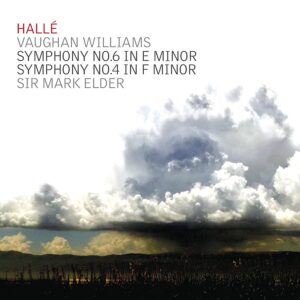The Fourth and the Sixth are the most dramatic and violent of Vaughan Williams’ nine symphonies, yet somehow Mark Elder manages to render them both with all the malice of a toothless shark. No. 4’s signature features–bracing dissonance and agitation–pretty much go for naught as the conductor reins in the music’s dynamic extremes while employing smoothed-over accents and softened rhythms (fatal in the third movement). Instead, the quieter, lyrical passages (particularly in the first movement and finale) gain prominence, and Elder does play these with a notable tenderness, as if he were trying to compensate for angrier, nastier bits. Accordingly, the orchestra plays in a frustratingly relaxed, almost subdued fashion (you can almost visualize the members wearing terrycloth robes). It’s stunning how much more involving Previn’s and Boult’s recordings are.
Symphony No. 6, composed at the end of World War II, is even grimmer, at times taking on a near-apocalyptic air. Well, usually. With Elder employing the same approach here as he did in the Fourth, the music ends up sounding like the soundtrack to a Lassie movie. The explosive first movement has none of the ferocity found in Slatkin’s, Previn’s, or Boult’s performances. The scherzo provides the most telling example: Kees Bakels’ Naxos recording brims with energy and excitement; Elder’s has you checking your watch.
I initially wondered if the low-level recording created the lackluster impression, but turning up the volume only confirmed the performance’s numbing cushiness. Not worthy of your money, or your time. Go for the listed alternatives.
































